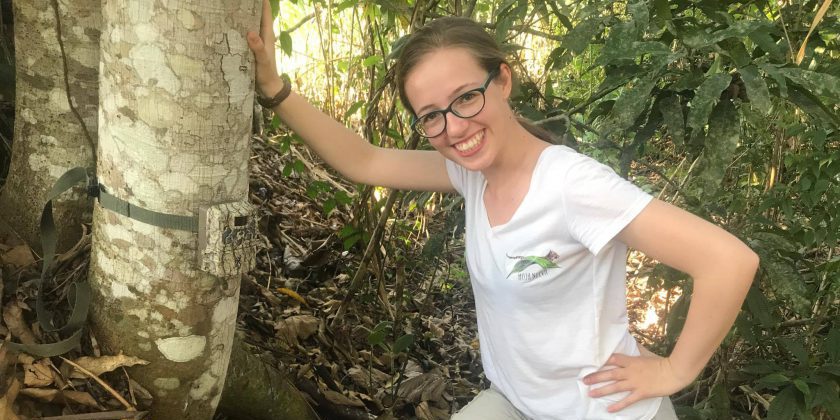
November 20, 2017, by Jackie Thompson
Tracking Big Cats in the Amazon: Work Experience with a Difference
By Cyan Turner, final-year, zoology
Are you interested in undertaking work experience in another country, but worried about cost? The International Work Experience Grant can offer up to £750 to support you.
Designed to help students take up work experience opportunities they might not otherwise be able to afford, the grant will support expenses such as accommodation, travel and visas, living costs and vaccinations.
In this blog, we meet Cyan Turner, a recipient of the grant currently studying towards an MSci in Zoology. Cyan volunteered with Hoja Nueva, a conservation non-profit in the remote Piedras region of Peru.
Can you give us some details of your placement?
I travelled to the Madre de Dios region of Peru to work as part of a team conducting a study on the impact of human activity on jaguar density. I also helped collect data on other big cats in the region.
My role as a research assistant meant I was helping to set up camera traps for data collection and conducting environmental assessments in the areas that traps were set up in.
How did you discover and secure your placement?
I discovered this placement through a family friend, who is president of the conservation group I was working for and lead researcher on my particular project. I had never met her in person before this placement but she knew my brother when he was in Peru, working in construction and later conservation.
What was your greatest achievement on placement?
My greatest achievement was when the lead researcher decided I was reliable enough to set up the equipment without direct supervision! I spent a day with the local guides and a member of the research team and directed the set up, which was a big responsibility as this data will be critical for the resultant scientific study.
What was your biggest challenge and how did you overcome it?
We spent over a week in a local community which was two days up-river by boat, and surrounded by remote tribes. The people there had different social expectations and spoke only Spanish and Qechua. These elements, combined with difficult weather, continuous hard work and illness, made that period of time difficult.
With the help of my team, however, we were able to communicate with the local people in order to maximise our efficiency and help each other endure the very difficult days; looking out for and encouraging each other.
How will your placement help you get a job after graduation?
I’ve demonstrated a range of skills by doing this placement, in particular the ability to continue professionally in very difficult situations. This quality will be in high demand in the career I want to get into: namely, conducting experiments in harsh environments to understand the origins of life on this and other planets.
Additionally, I’ve demonstrated independence and initiative simply by seeking out and taking this placement, which are transferable skills for any other employment opportunities that may come my way in the meantime.
Which three top tips would you give someone else thinking of doing a placement abroad?
- Make sure you are cut out for being so far away from everything you know. There was one person who was meant to be part of our research team who lasted two days in the Amazon because they were homesick, so be sure before you commit. It can be expensive if you need to return home!
- Plan for things to go wrong. The best-laid plans are the ones that often change, and when you’re by yourself in a foreign country having contingency plans is the best way to stay safe.
- Look for the silver linings in everything. There will be days when things don’t seem as amazing as you imagined but there is always a positive side to everything. Even if you feel terrible in the moment, you know that one day you will look back on this as a fantastic learning experience and you can say “hey, I did that!”
Interested in pursuing work experience abroad? We have plenty of advice on where to look for opportunities and how to prepare before going.
Find out more about the International Work Experience Grant and how it could help you fund a placement overseas by visiting our website.
Next Post
Should I Do a PhD? The Pros and ConsNo comments yet, fill out a comment to be the first

Leave a Reply